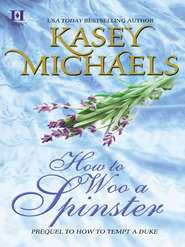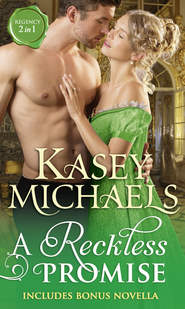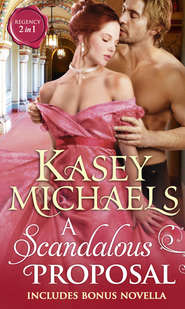По всем вопросам обращайтесь на: info@litportal.ru
(©) 2003-2025.
✖
The Questioning Miss Quinton
Автор
Год написания книги
2018
Настройки чтения
Размер шрифта
Высота строк
Поля
Flushing hotly to the top of his bald head, the solicitor quickly returned his attention to the will, reading importantly: “To Patrick Sherbourne, Eleventh Earl of Wickford, I hereby bestow all my considerable volumes of accumulated knowledge, as well as the research papers of a lifetime, with the sincere hope that he will, as it befits his moral responsibility as an honorable gentleman, continue my important work.”
“He never did!” came the incredulous outburst from the housekeeper as she whirled about in her seat to look compassionately at Professor Quinton’s only child. “Oh, Miss Victoria, I be that sorry!”
“Not half as sorry as I am,” Patrick told Standish in an undertone. “I shall have to build another library at Wickford just to hold the stuff.”
“If I might continue?” the solicitor asked as the housekeeper’s exclamation had set the two other occupants of the room—a miserably out-of-place kitchen maid who was ten pounds richer than she had been that morning, and a man already mentioned in the will and identified as the Professor’s tobacconist (and the recipient of all the Professor’s extensive collection of pipes)—to fidgeting nervously in their chairs.
“It’s all right, Willie, honestly,” Victoria Quinton soothed softly, patting the housekeeper’s bony hand. “I’m sure the Professor had his reasons.”
Wilhelmina Flint sniffed hotly, then said waspishly, “He had reasons for everythin’ he did—none of them holdin’ a thimbleful of thought for anyone save hisself.”
“Enough! What’s done is done. Please continue, sir.” Victoria said in a voice that fairly commanded the solicitor to get on with it.
“To Mr. Pierre Standish—who knows why—I bequeath in toto the private correspondence in my possession of one M. Anton Follet, to be found in a sealed wooden box presently in the possession of my trusted solicitor.”
Upon hearing this last statement, Patrick stole a quick look at his friend, but could read no reaction on Pierre’s carefully blank face.
“The remainder of my estate passes in its entirety to one Miss Victoria Louise Quinton, spinster. That’s the last bequest,” the solicitor told them, already removing his spectacles in preparation of quitting the premises. “Mr. Standish, I have the box in question, and the key, here on the desk. If you’d care to step up, I’ll relinquish them as soon as you sign a receipt to that effect.”
“My, my. Secret correspondence, Pierre?” Sherbourne suggested, looking at the other man intently. “Do you know this Follet fellow?”
“I know a great many people, Patrick,” Standish answered evenly, already rising from his uncomfortable seat to bow slightly as the ladies quit the room, Miss Quinton in the lead, the uneven hem of her black gown sweeping the floor as she went. “Your recurrent curiosity, however, begs me ponder whether or not I should be performing a kindness by furnishing you with a comprehensive listing of my acquaintance, as a precaution against your spleen undergoing an injury, for example.”
“Put m’foot in it again, didn’t I, Pierre? And after I promised, too,” Patrick remarked, grimacing comically at his faux pas. “I’ve no doubt you’ll soon find me nattering with the dowagers at Almack’s—lingering at the side of the room so as to catch up on all the latest on-dits. I implore you—can you think how to save me from that pitiful fate? Perhaps, in your kindness, even suggest a remedy?”
“A diverting interlude spent in the company of young Mademoiselle La Renoir might prove restorative,” Standish offered softly, accurately identifying Wickford’s latest dasher in keeping. “I hear the dear lady is inventive in the extreme—surely just the sort of diversion capable of ridding your mind of all its idle wonderings.”
“While ridding my pocket of yet another layer of gold, for La Renoir goes through her ingenious paces best when inspired by the sparkle of diamonds.” The Earl shook his head in the negative. “How jaded I have become, my friend, for I must admit that even Marie’s seemingly endless repertoire of bedroom acrobatics have lost their ability to amuse me. I’d replace her, if not for the ennui of searching out a successor. My idle questions to you today are the most interest I have shown in anything for months. Perhaps I am past saving.”
“Er, Mr. Standish,” the solicitor prompted, pointedly holding his open watch in the palm of one hand.
Standish ignored the man as if he hadn’t spoken. “Boredom can be the very death,” he told Patrick sympathetically, idly stroking the thin, white, crescent-shaped scar that seemed to caress rather than mar the uppermost tip of his left cheekbone. “I was bored once, my dearest, so you may believe that I know whereof I speak. Ended by wounding my man in an ill-advised duel, as a matter of fact, and nearly had to fly the country. That woke me up to the seriousness of my problem, I must say! Once free of the benighted bolt hole I had been forced to run for until the stupid man recovered—for a more cowhanded man with a sword you have yet to see—I vowed to show a burning interest in all that had been so nearly lost to me.”
“Such as?” Patrick prompted.
“Such as, my darling Patrick, an extreme curiosity about the human condition, in all its frailties. Oh yes— I also acquired an even more intense concern for my own preservation.”
“I’d really rather not carve up some poor innocent, just to start my blood to pulsing with the thrill of life, if you don’t mind, Pierre,” Wickford pointed out wryly. “Although I am sure that is not what you are suggesting.”
“What I am suggesting, darling, is that you look about yourself for some enterprise or pursuit that can serve to hold your interest for more than a sennight. In my case, the observation of my fellow creatures has proven to be endlessly engrossing. For you, well, perhaps Professor Quinton’s papers will inspire you to complete his work.”
“Or prod me into slitting my throat,” the Earl muttered, shaking his head. “I do see your point, Pierre. I thank you, and I promise to give your suggestions my deepest consideration.”
Extracting a perfumed handkerchief from inside his sleeve, Pierre waved it languidly before touching it lightly to the corners of his mouth, saying, “It was nothing, my darling man. But I’m afraid I really must leave you now, before our poor solicitor person suffers a spasm, dithering back and forth over the fear of offending me and his desire to return to his own hearth and slippers—although I fail to comprehend why anyone should fear me, as I am the most peaceful man in all England.”
“And I’m next in line for the throne,” Sherbourne responded playfully, to be rewarded by one of Standish’s rare genuine smiles.
“Et tu, darling?” he commented without rancor. “Ah well, I imagine this common misconception of my character is just a cross I must bear. Pray keep me informed of your progress, my dearest Patrick, for I shall fret endlessly until I know you are restored to your usual good frame.”
CHAPTER TWO
PATRICK REMAINED in his chair, idly watching Standish sign the receipt with a flourish and then depart, a small oblong wooden box tucked neatly under his arm. Perhaps he was desperate for diversion, but Patrick would have given a tidy sum to know the contents of that box. Pierre was a good friend, but not very forthcoming, and it was slowly dawning on Patrick just how little of a personal nature he really knew about Pierre Standish, even after serving with him in the Peninsula.
He looked around the book-lined room, wondering if M. Anton Follet was mentioned in any of the volumes, or in any of the papers holding Professor Quinton’s extensive, although incomplete, history of the British upper class. His own research was devoid of any such reference, he knew, but then he had not gone much beyond a compilation of his and a half dozen other loosely related family histories before the whole idea had begun to pall and he had shelved the project (as he had so many others that he had begun in the years since his return to London from the war).
Rising stiffly from his chair—for he had spent the previous evening with Marie La Renoir and his muscles were still sending up protests—he realized that he and Miss Quinton, who had at some time reentered the library unnoticed by him to stand in the shallow window embrasure, were now the only occupants of the depressing room.
Steeling himself to pass a few moments in polite apology for having somehow usurped her claim on her father’s life work (it would never occur to him that either he or Standish should apologize for their rudeness during the reading of the will for, in their minds, the crushing boredom of such an occasion had made them sinned against rather than sinning), he walked over to stand in front of her, a suitably solemn expression looking most out of place on his handsome, aristocratic face.
“Miss Quinton,” he began carefully, “I can only tell you that your father’s bequest came as a complete surprise to me. As I could not but help overhearing your housekeeper’s refreshingly honest reaction at the time, I can only assume that you had a deep personal interest in his work.”
Victoria Quinton turned around slowly to look at the Earl levelly, assessingly—dismissively. “Yes, you would have assumed that, wouldn’t you?”
Patrick blinked once, looking at the young woman closely, unwilling to believe he had just been roundly insulted. She was standing stock-still in front of him, her hands clasped tightly together at her waist, the picture of dowdy dullness. He had to have been mistaken—the woman hadn’t the wit to insult him. “I assure you,” he then pressed on doggedly, “if there are any papers you particularly cherish—or any favorite books you would regret having pass out of your possession—you have only to mention them to me and I will not touch them.”
“How condescending of you. In point of fact, sir, I want them all,” Victoria Quinton replied shortly. “Indefinitely. Once I have discovered what I need to know, Lord Wickford, you are welcome to everything, down to the last bit of foolscap. Make a bonfire of it if you wish.”
Not exactly the shy, retiring sort, considering her mousy exterior, Sherbourne thought, his curiosity reluctantly piqued. Possessing little that would appeal to the opposite sex, she had probably developed an animosity toward all men; no unmarried miss of his acquaintance would dream of speaking so to him. “Would it be crassly impolite of me to ask what it is you hope to discover?” he asked, staring at her intently.
Victoria turned smartly, her heavy black skirts rustling about her ankles, and headed for the hallway, clearly intending to usher her unwelcome visitor to the door. “It would be, although I am sure you feel that being an earl makes you exempt from any hint of rudeness. But I shall nevertheless satisfy your curiosity, considering your generosity in allowing me use of the Professor’s collection. I shall even pretend that I did not overhear your complaints when you first heard of the bequest.”
Patrick’s dark eyes narrowed as he stared after this infuriating drab who dared to insult him. “How kind of you, Miss Quintin,” he drawled softly as they stopped walking and faced each other. “I vow, madam, you fair bid to unman me.”
Miss Quinton’s left eyebrow rose a fraction. “Indeed,” she pronounced flatly. “As I was about to say, sir: I have dedicated myself to the unmasking of the man who murdered the Professor. The answer lies in his papers, and I shall not rest until the perpetrator is exposed. And now, good day to you, sir.”
She then moved to stand beside the open door that led down three shallow steps to the flagway lining the north side of Ablemarle Street. But her startling disclosure (and jarring candor) had halted Wickford—who could only view departing the house as his single most cherished goal in life—in his tracks, leaving him standing some distance from the exit.
“Find the murderer?” he repeated, not trying very hard to hide his smile. “How very enterprising of you, madam. Have you perhaps looked underneath your bed? I hear that many spinsters believe murderers lurk in such places.”
Victoria’s chin lifted at the insult. “I’m positive you are considered quite amusing by your friends in those ridiculous clubs on St. James’s Street, but I can assure you that I am deadly serious.”
“But your father was killed by a burglar he must have discovered breaking into his library,” Patrick pressed on, caught up in the argument against his will. “Murder, yes, I agree, but it’s not as if the man’s identity could be found amid your father’s research papers or personal library. I fear you will have to resign yourself to the sad fact that crimes like this often go unpunished. Law enforcement in London is sorry enough, but investigations of chance victims of violence like your father are virtually nonexistent.”
The front door closed with a decided crash as Victoria prepared to explain her reasons to the Earl—why, she did not stop to ask herself—so incensed was she by his condescending attitude. “The Professor knew his murderer, probably opened the door to him, as a matter of fact. I have irrefutable evidence that proves my theory, but no one will listen to me. I have no recourse but to conduct my own investigation.”
“What is your evidence?” Patrick asked, feeling a grudging respect for her dedication, if not her powers of deduction.
“That, Lord Wickford, is of no concern to you,” she told him, pulling herself up to her full height. As she spoke she slipped a hand into the pocket of her gown, closing her fingers around the cold metal object that was her only lead toward discovering the identity of the murderer. “Suffice it to say that I have in my possession a very incriminating clue that—while it does not allow me to point a finger at any one person—very definitely lends credence to the theory that you, sir, or one of a small group of other persons I shall be investigating with an eye toward motive, entered the Professor’s library as a friend and then struck him down, leaving him to lie mortally injured. Before dying in my arms the Professor charged me with the duty of bringing his murderer to justice and, I say to you now in all sincerity, sir, that I shall do just that! All I ask of you is some time before you remove the collection. I will notify you when I no longer require it.”
“Admirable sentiments, eloquently expressed, Miss Quinton,” Patrick owned soberly, “although I feel I must at this point protest—just slightly, you understand—that you have numbered me among your suspects.”
Bats in her belfry, Patrick then decided silently, becoming weary of the conversation. That’s what happens to these dusty spinster types after a while. But aloud, he continued, “I’ll respect your right to hold to your own counsel about your ‘clue,’ of course. But my dear Miss Quinton, you must know that I would be shirking my duty as a gentleman if I didn’t offer you my services should you find yourself in need of them. That is, if you are willing to accept help from one of your suspects?”
“I shan’t need your help,” Victoria retorted confidently, deliberately ignoring the vague feeling of unease that had been growing ever since she first began this strange conversation. Longing to do Sherbourne an injury, she thought to herself: If I cannot throw actual brickbats at him, I can at least attack him verbally. “For now,” she continued in a voice devoid of emotion, “it is enough that I have been able to interview my first suspect. I might add, sir, that I shall strive not to allow your boorish behavior today—and all I have read in the newspapers about your questionable pursuits—to prejudice me against you. At the moment, you are no more suspect than any of the other gentlemen who could have committed the crime.
“I apologize for baiting you so openly, Lord Wick-ford,” she then conceded, her voice softening a bit, “but you are only the second suspect I have encountered today, you understand, the first having escaped before I could speak with him. I was merely testing your responses, feeling you out as it were,” she added, not entirely truthfully, for in fact her opinion of him and his kind was not especially high.
Now Victoria had Sherbourne’s complete attention. “Second suspect, you say? As I doubt that either the solicitor or that down-at-the-heels tradesman who scurried out of here with the Professor’s collection of pipes is capable of murder, could you possibly be trying to tell me that Pierre Standish is also to be considered a suspect? My, my,” he remarked, seeing the answer on her expressive face. “At least, Miss Quinton, you have put me in good company, although I imagine I should be feeling quite put out with you for even supposing I could have had anything to do with your father’s death, except for the fact that I find it extremely difficult to take seriously anything you have said. Your last revealing statement implicating Mr. Standish has served to confirm my opinion of the worthlessness of your arguments.”











